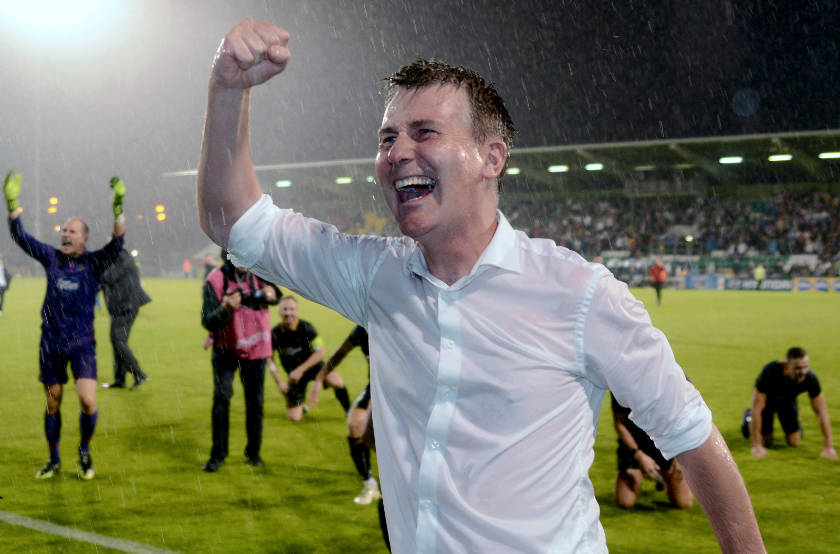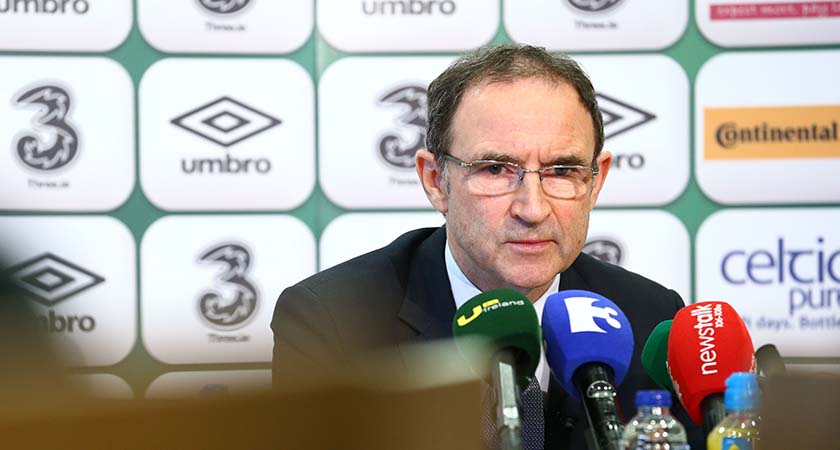AS big statements go, Richard Dunne’s take on what Martin O’Neill used to say inside the Aston Villa dressing room will hardly stay as long in the memory bank as Sam Allardyce’s confessions.
Yet it has provoked a widespread debate throughout the Irish football community, leading to the kind of introspection that normally follows a major sporting disaster rather than a credible away point against decent opposition.
Pointedly Dunne went on to argue that Irish teams know only one way to play and that under O’Neill an alternative to Plan A will probably be the unveiling of a modified version of Plan A – an opinion which stems from his time working under the current Irish manager at Villa Park.
“I remember when he signed me,” Dunne said. “We had a match that night against Birmingham City and I asked him what the tactics were for corners. He just looked at me and said, ‘you’re 6”4, you’re a good player, I wouldn’t have signed you if you weren’t, so just go out and head the ball when it comes into the box’.
“I know that sounds too basic. But I’ve had other managers who confused you with a barrage of instructions. Martin’s points were simple to understand. And they worked.”
As they have with Ireland, where wins over Germany and Bosnia brought the team to France and a win over Italy kept them there longer than anyone expected.
A new campaign marks new ambitions, though. “France is history, we want to create new memories,” O’Neill said. Yet his way of going about things doesn’t appear to have changed, judging by what we saw in Belgrade last month, when Ireland completed only 94 successful passes, which obscured the fact they also completed a fine night’s work, achieving their objective of winning an away point against one of the stronger teams in the group.
Still, the performance as well as the result left Dunne frustrated. “Watching (Ireland play) drives you mad,” Dunne said. “You are thinking 'Jesus, just do something different. Just pass it.' It is so easy to watch and criticise from a distance but I know from experience that when you are on the pitch, it is like that [tunnel vision]. You have the ball, you look up, and all you can see are the jerseys of the opposition players. It's frustrating for a fan and must be frustrating for the players who are running left and right and not getting a touch of the ball."
Yet, Dunne claimed, it was always thus. "Any Ireland win against a good team always seems to have been a heroic performance with defenders and goalkeepers, everyone, throwing their bodies on the line. It's never been a composed, controlled demolition of a Holland or a Germany. And I don't know why that is. Is it the mindset? Are Irish kids growing up watching these matches taking only one thing from them – basically the sight of players throwing themselves in front of the ball? Do they think Ireland can only beat these teams by being scrappers and throwing themselves around?”
The answer, coming from an unlikely source, is no.
Unlike Dunne, Stephen Kenny is not widely known. Without a playing career worth talking about, he has spent the majority of his footballing life in management, getting his first job as a 26-year-old before he survived three job dismissals to rebuild his reputation, and Dundalk FC, over the last four seasons.
 Dundalk boss Stephen Kenny celebrates a huge win for Irish football [©INPHO/Ciaran Culligan]
Dundalk boss Stephen Kenny celebrates a huge win for Irish football [©INPHO/Ciaran Culligan]“I just cannot tell you how strongly I disagree with that. But that’s the narrative that people believe. And they are conditioned to believe it. This game is about having the ability to pass the ball, to believe in yourself, to believe you can fulfil your potential as players and as a team; it is about seeing where that takes you.”
Where he has taken Dundalk is to an unexpected place, the group stages of the Europa League, where their style of play has won them admirers, and points. “Traditionally, when I thought of Irish teams, I thought of 4-4-2, long balls, chase to the corners, that sort of stuff,” Shota Arveladze, the former Rangers striker and Maccabi Tel Aviv manager, said last week. “Dundalk, though, are different.”
And that’s Kenny’s point. He believes Irish football can be different, that it is possible for teams to succeed by showing flair rather than just functioning within a drab framework. “You have to take risks and believe in your players’ ability,” he said.
All of which brings us to this weekend. Georgia and Moldova wait. Six points are demanded. Yet so, from some, is a sense of adventure and dash, a declaration of intent from O’Neill that his team can outplay as well as outwork the opposition.
If the idealists are hopeful the Ireland manager will implement their philosophy, then they’d be well advised to get ready for disappointment.
“With football, not everything is a beautiful moment," O’Neill said. “Look, we played well in the Euros – but this is a new competition now and you have to fight for every minute.
“I’ve got past the stage where I worry about what people are saying. So yes, it would be great to get the ball down every minute of every game and entertain people on the way to success. But not even Spain can do that.”
 Martin O'Neill [©INPHO/Cathal Noonan]
Martin O'Neill [©INPHO/Cathal Noonan]Six points from those two qualifiers would leave Ireland in a position to strike for World Cup qualification – something they haven’t achieved since Mick McCarthy guided the team to the 2002 finals in Japan and Korea.
“We believe it can happen – and I believe that it has a better chance of happening with myself and Roy Keane here,” O’Neill said.
“But sometimes you will win games well and sometimes you have to be happy with the result.
“What I mean by that is that no one here – Roy Keane, as a prime example, would be advocating you should be thumping the ball long. But there is a time and place for everything. Take my old boss, Brian Clough. He famously said once, that if God wanted football to be played in the air then he would have put grass in the sky.
“Well, that is complete boll**ks and not something he preached to us. I can remember him coming into the dressing room at half-time – when we have pity-pattied around and he has told us to thump it forward because he wanted to get an idea into our head, that you play in important areas of the field and if you have the ability to play it.
“If we could pass the ball out like Spain, we would do it, but we don’t possess that technical ability. Sometimes you just have to win – any way you can.”
Back-to-back wins over the next week will silence the doubters, the critics and the purists. But they won’t go away not until this Ireland team become a side of style as well as one of substance.

